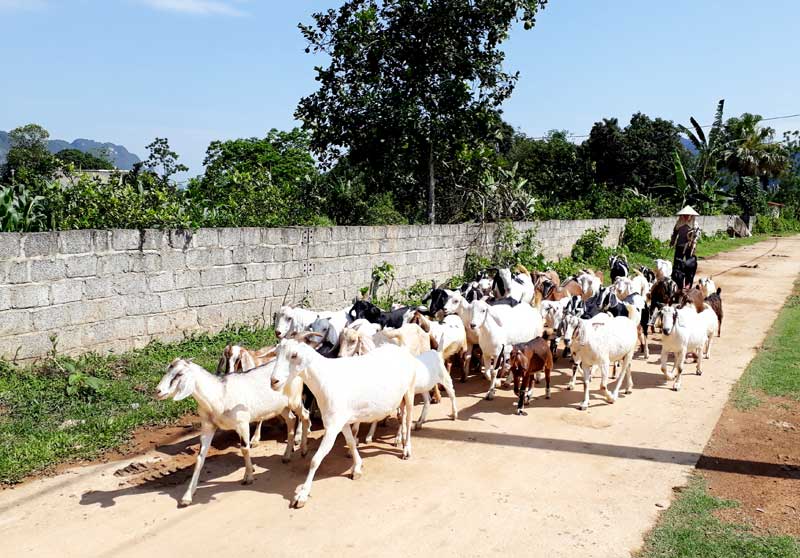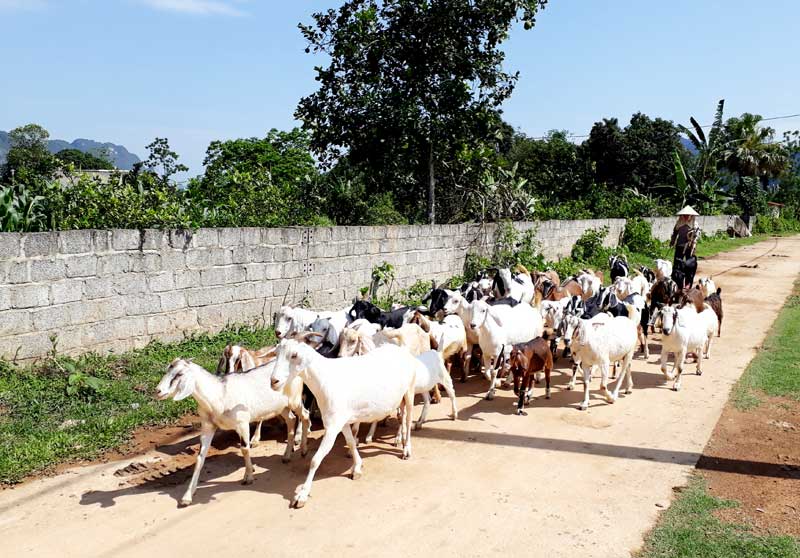
(HBO) - Ba Hang Doi township will be developed into the second socio-economic, cultural hub of Lac Thuy district. That is the goal set by the Party Committee and authorities of Lac Thuy district for the 2021 – 2025 period.
 Thanks to bold investment in new models,
residents of Ba Hang Doi township, Lac Thuy district have improved value of
agricultural production. Photo: The goat farming model is spreading in the
locality.
Thanks to bold investment in new models,
residents of Ba Hang Doi township, Lac Thuy district have improved value of
agricultural production. Photo: The goat farming model is spreading in the
locality.
The provincial People’s Committee agreed
with the policy of adjusting and expanding a master plan on Ba Hang Doi township
until 2030 with a vision to 2035. It lays a foundation for the district to turn
Ba Hang Doi township into the second socio-economic and cultural hub, behind
Chi Ne township in the near future.
To meet such goal, Thanh Ha township and
Thanh Nong commune have put into operation many works and projects using the
State budget, contributing to creating a new facelift for urban and rural
areas.
To help Ba Hang Doi meet criteria for the
fifth-tier urban area, the local Party Committee and authorities have always
received support of people from walks of life, thereby making important
contributions to the rapid and synchronous change in the urban and rural face
of the township. As of the late 2020, the township recorded an average income
per capita of 47.4 million VND each year.
By 2025, it strives to approve investment
in socio-economic infrastructure as planned, make a list of important projects
and works that serve as a driving force for economic development, build new
urban areas meeting criteria in terms of population, social and technical
infrastructure and landscaping for the sake of sustainable development. At the
same time, the province will create favourable conditions for individuals,
organisations and businesses to carry out production-trade projects to meet
public demand. It is considered a solid foundation for Ba Hang Doi township to
become a socio-economic and cultural centre that plays a significant role in
the strong and comprehensive development of Lac Thuy district in the future./.
According to data from the Hoa Binh Provincial Party Committee, the industrial production index for the first six months of 2025 is estimated to have increased by 20% compared to the same period last year. This marks the highest year-on-year growth rate for this period since 2020.
In the first six months of 2025, Hoa Binh province’s export turnover was estimated at 1.145 billion USD, marking an 18.11% increase compared to the same period in 2024. Import turnover was estimated at $ 804 million, a 17.15% increase, which helped the province maintain a positive trade balance.
The lives of the ethnic minority farmers in Tan Lac district have gradually improved thanks to the new directions in agricultural production. This is a testament to the collective strength fostered through the professional associations and groups implemented by various levels of the district’s Farmers’ Union.
With the motto the "product quality comes first,” after nearly one year of establishment and operation, Muong village’s Clean Food Agricultural and Commercial Cooperative, located in Cau Hamlet, Hung Son Commune (Kim Boi district), has launched reputable, high-quality agricultural products to the market that are well-received by consumers. The products such as Muong village’s pork sausage, salt-cured chicken, and salt-cured pork hocks have gradually carved out a place in the market and they are on the path to obtaining the OCOP certification.
In the past, the phrase "bumper harvest, rock-bottom prices" was a familiar refrain for Vietnamese farmers engaged in fragmented, small-scale agriculture. But today, a new spirit is emerging across rural areas of Hoa Binh province - one of collaboration, organisation, and collective economic models that provide a stable foundation for production.
Maintaining growing area codes and packing facility codes in accordance with regulations is a mandatory requirement for agricultural products to be eligible for export. Recently, the Department of Agriculture and Environment of Hoa Binh province has intensified technical supervision of designated farming areas and packing facilities to safeguard the "green passport" that enables its products to access international markets.



 Thanks to bold investment in new models,
residents of Ba Hang Doi township, Lac Thuy district have improved value of
agricultural production. Photo: The goat farming model is spreading in the
locality.
Thanks to bold investment in new models,
residents of Ba Hang Doi township, Lac Thuy district have improved value of
agricultural production. Photo: The goat farming model is spreading in the
locality.